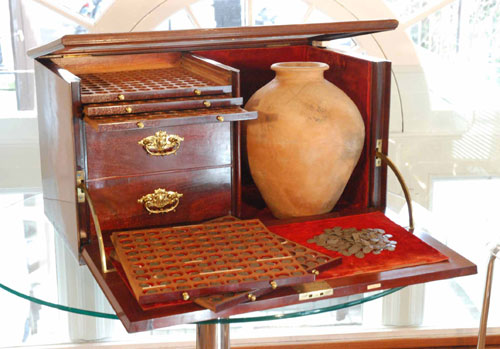
PREV ARTICLE
NEXT ARTICLE
FULL ISSUE
PREV FULL ISSUE
MORE ON THE BISHOP'S WOOD HOARD OF ROMAN COINS
Caroline Newton of Baldwin's forwarded this post-sale write-up about the Bishop's Wood Hoard of Roman Coins.
-Editor

Sold as part of Baldwin's auction 64-65 on the 4th-5th May, the Bishop's Wood Hoard of Roman coins was amongst the lots in the Ancient section which opened the second day of the sale. The 1,661 coins and the restored jar that contained them were sold in 11 lots, including the purpose built cabinet in which they were housed. The lots drew worldwide interest amongst the ancient numismatic community prior to the auction as the expertly cleaned and preserved coins had remained out of circulation and in the family of the landowner since their discovery in 1895. Serious pre-sale interest came mainly (and encouragingly) from UK based dealers and collectors but also from some important UK institutions. Bidding was frenzied and busy, both in the room and on the book, but in the end the lots were all won by the same bidder. Baldwin's are very happy to report that this part of the hoard remains intact. In total the 11 lots (lots 1152-1162) achieved £46,964, well over pre-sale estimate. Baldwin's Ancient expert Paul Hill commented after the auction ‘the sale of this hoard was an unprecedented success, it sold well beyond any of our expectations and the vendor is absolutely delighted with the result.' The hoard was discovered at Bishop's Wood, near Ross-on-Wye, just across the Herefordshire border and within the surroundings of the Forest of Dean. It was uncovered in a rough walling built against the hillside by workmen who were in the process of repairing a road and who struck an earthenware vessel containing the coins. The accidental strike from a pick broke the jar and scattered its contents in various directions.
Included with the hoard is a reprint of the article from the Numismatic Chronicle of 1896 where 17,550 coins were
listed in total and a reprint of ‘Notes on a Great Hoard of Roman Coins found at Bishop's Wood in 1895' from the
“Transactions of the Bristol and Gloucestershire Archaeological Society”, vol. XIX, both written by Mary Bagnall-
Oakeley. The latter also includes the author's handwritten annotations and a list, dated March 1898, of the
museums and institutions that she was aware had received portions of the hoard. They are listed as follows:
Hereford City Museum
Although 17,550 coins were listed originally a number had already been lifted and dispersed around the region by the time the coins were rescued. The original intention of the hoard and why it was deposited at the findspot is uncertain. It is possible that the area in question was occupied by Roman soldiers at the time and, given its size, it has been suggested that the hoard formed part of a military treasure, intended as payment for the legions. Whatever the original purpose of the coins, the hoard is a fascinating primary source of information for the mints employed in supplying Britain with coinage. For more information about the hoard please contact Baldwin's Ancient specialist Paul Hill at paul@baldwin.co.uk.
To read the earlier E-Sylum article, see:
THE BISHOP'S WOOD HOARD OF ROMAN COINS
(www.coinbooks.org/esylum_v13n07a20.html)
The Numismatic Bibliomania Society is a non-profit organization promoting numismatic literature. See our web site at coinbooks.org. To submit items for publication in The E-Sylum, write to the Editor at this address: whomren@gmail.com To subscribe go to: https://my.binhost.com/lists/listinfo/esylum All Rights Reserved. NBS Home Page Contact the NBS webmaster 
|